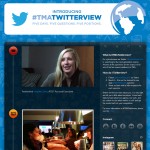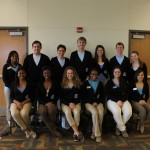This article is the third post in an ongoing series about student leaders and how they choose where to start their careers. Before reading this post, please read:
- The 3 types of students and how they approach their careers
- How student leaders choose where to work: Introduction
Phase 1: Exploration
How students find jobs may seem simple enough – they just go online, apply and either get hired or they don’t, right?
 Well, sure, that’s how some students find jobs – but not our fascinating group of Engaged Leaders.
Well, sure, that’s how some students find jobs – but not our fascinating group of Engaged Leaders.
They go through three distinct phases – Exploration, Connection and Decision – before ultimately accepting a job offer (and some of them will have the opportunity to choose between many offers).
The first phase is the one that you, as an employer, have the most control over. The Exploration phase presents the greatest opportunity for these top students to learn about your organization and its careers – your employer brand, in other words.
Exploration for students, however, begins long before they become concerned with your employer brand.
For them, Exploration involves figuring out what they like to do, what types of careers are out there, which industries have career opportunities in their area of interest and much, much more. Remember: at this point in their careers, their career knowledge is relatively limited.
Plus, as we discovered in the Introduction, even many top students have no idea what they actually want to do; they desperately need our (employers, on-campus career services and online career resources like TalentEgg) help figuring it out.
Exploring the possibilities
Unless they’re in a vocation-specific program, students typically find themselves studying very general disciplines (e.g., business, arts, science, etc.) with the potential to go into a number of different industries and career paths.
And before they even get to you, they must decide which of those to pursue. It’s a huge undertaking – and one that can be extremely stressful and frustrating.
That’s one area where we here at TalentEgg excel – many of our offerings for students are designed with the Exploration phase in mind, including our employer profiles, how our Find A Job search function is set up, as well as our industry Career Guides and online career magazine, the Career Incubator.
Students are exposed to a wide range of information, resources and success stories that ultimately aid them in narrowing down their passions, strengths and career goals.
Furthermore, TalentEgg is also designed so students aren’t limited by what they don’t know, such as job titles that are unique to a certain company.
There is a huge amount of opportunity for employers here as well. The Engaged Leaders we surveyed mentioned that they were interested in having employers provide the essential career-related skills and information they don’t typically learn in school: industry-specific knowledge, career paths, essential skills, etc.
In fact, they see this as a yet-untapped employer branding tool:
“Employers should use less of a ‘join our company’ pitch and more of a ‘consider this field’ pitch. By getting students interested in the industry of their organization, employers can ensure that the people who apply will be passionate about the field; additionally, since the employer was the students’ first exposure to the field, they will automatically flock to that company even without spending a great deal of time talking about the benefits and perks of being in XYZ Inc.”
—Second-year Financial Modelling and HBA student
Western University
Remember, during the Exploration phase, students are looking to develop connections but they don’t necessarily know what they’re looking for – yet. These connections could be with your culture, the career development you offer, the people at your organization, etc.
How to develop connections with students during the Exploration phase
Be the company that helps them figure it out!
Overall, the name of the game is stepping outside of the function of your own organization and the jobs you’re hiring for to provide information that students are likely eager to learn about the industry you operate in and the potential career paths within that industry. Here are a few ideas:
On-campus
- “Introduction to [your industry]” information sessions for first, second and third-year students
- Develop relationships with professors/instructors in order to provide practical insight that will complement what students are learning during an in-class visit
- Encourage recent graduate employees to volunteer with their former schools as alumni mentors
Social media
- Share general knowledge about your industry via your campus Facebook, LinkedIn and Twitter accounts
- Ideas: “Did you know?”, define industry jargon, explain how things work, link to informative content, share industry news
- Then, generate ongoing discussions about these topics with your talent community
Articles and videos
- Create, or ask your partners like TalentEgg, to create content such as articles and videos that will help students explore your industry and take steps toward becoming successful in it
- Share the “success stories” of real students and recent graduates
Internally
- Create internal networking opportunities between your interns/co-op students and their senior colleagues
- Coach interns/co-op students on where they might go within your organization and industry after they graduate – illustrate the options
- Provide in-depth knowledge training to ensure interns/co-op students fully understand the nuances of your industry, your organization’s niche within that industry, and how their career path fits within it
Discussion: How does your organization help students through the Exploration phase? Which strategies might you implement in the future?







Leave a Reply
You must be logged in to post a comment.